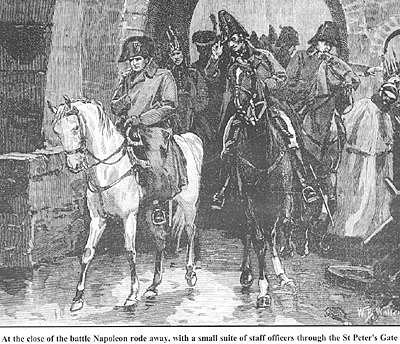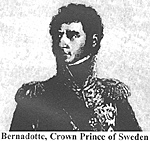The Battles Around Leipzig
October 1813
Decision to Evacuate
by DH Parry
Edited by Gay Gibson
| |
At the close of the battle Napoleon rode away, with a small suite of staff officers through the St Peter's Gate. Waking, he received a report from Generals Sorbier and Dulauloy, of the artillery, to the effect that since the actions began the French had expended no less than 250,000 cannon balls and including the reserve, there only remained 16,000 more, or enough for two hours firing. The Austrian return for the 16th and 18th is 56,000 from 320 guns alone. That of the whole allied army must have been something stupendous! Order upon order did the baffled emperor give, directing his troops to retreat by the causeway on Lindenau, which was still held by Bertrand; and somewhere about 8 o'clock Napoleon rode away to Leipzig, where, finding the Thunberg crowded with wounded, he put up at the " Prussian Arms," or, as some have it, the “Hotel de Prusse”, in the horse-market, leaving his windmill at the same time that Excelmann’s division started for Lindenau, which they did not reach until 4 a.m. The night was intensely and unusually dark. The plain was thronged with the retreating army and so great was the confusion inside the city that corps had passed through before the inhabitants realised that the French were leaving them. The baggage entered by four gates, and tried to get out through one, and that so narrow that a single carriage alone could pass it at a time. Farther on again, the Cow Tower was only the same width, and nowhere the road more than thirty feet from side to side, crossing three English miles of meadows and five unfordable streams by small bridges until it reached a larger bridge finally conveyed it to firm ground. No sleep had Napoleon that night, nor indeed had anyone in Leipzig save those utterly worn out by the protracted struggle, for the city rang with tumult as the troops struggled through the streets, often in single file where the way was blocked with wagons and guns. Mounted Grenadiers of the Old Guard, Cuirassiers muffled against the rain in white cloaks, conscripts crying from very weariness -- all streaming onward, under the windows of the hostelry itself where Napoleon, in his dressing gown and with head tied in handkerchief, sometimes looked out on the mob which had no “Vive L’Empereur!” then. For once the Grand Army -- or rather, its remnants -- showed a provident spirit, making great efforts to guide large herds of lowing cattle through the press, in which they, were not altogether successful, and only added to the confusion thereby, as we read that numbers of oxen were browsing quietly in the town ditch when the Allies stormed the suburbs next day. Officers had pleaded for the construction of other bridges over the Pleiss and the marshes, and one had been made, though by whom is not clear; but it broke down as the first battalion crossed it, and was not replaced, Berthier afterwards making his usual excuse, “The emperor had given no orders.” Napoleon's horse was waiting at 2 o'clock in the morning but it was 9 when he got into the saddle, and for half an hour before that the enemy's cannon had been heard beyond the Grimma suburb. The King of Saxony To the house where the King of Saxony was staying the emperor rode at a quick pace, and for twenty minutes he was alone with his faithful ally and the distressed Queen, the king ultimately attending him to the head of the staircase when he took his departure. Apparently irresolute what course to pursue he threaded the crowd with some difficulty, and finally dashed by St. Thomas's Church to the gate of St. Peter, where he paused in obvious indecision. His proposal to the allies, that he should evacuate the city, and declare all the Saxon troops neutral, on condition that he be allowed to convey his artillery and baggage to a specified point, was insulting to the intelligence of those to whom he had addressed it, and the guns he heard thundering on several sides made a fitting reply. Still, he seemed loath to go and finally rode as far as the Civic School in the direction of his quarters. There he came under fire, and is said to have had an interview with Prince Joseph Poniatowski, nephew of the last king of Poland, and as brave a man as any in that brave age. So hotly had the prince been engaged in the various battles about Leipzig, that fifteen officers of his personal staff had been killed or wounded; he himself had been hit on the 14th and again on the 16th, and he was to receive two further wounds before the waters of the Elster closed over him for ever. To him Napoleon entrusted the Borna suburb with a handful of 2,000 Polish troops, and Poniatowski’s last words to the man who had made him a Marshal of France two days before were “We are all ready to die for your Majesty!” Lauriston, Macdonald, and Reynier likewise remained in Leipzig. Abandoning an idea he had entertained of firing the suburbs to check the enemy, Napoleon gave orders to protract the resistance and rode away with a small entourage through St. Peter's Gate, calm and inscrutable of face but as eyewitnesses tell us, in a profuse perspiration. “Place pour Sa Majesté!” secured no passage; the chaos of the Berezina was in progress, without the snow, though the Cossacks were close at hand. Napoleon was compelled to leave the highway, the fugitive emperor plunged into a labyrinth of lanes, and had proceeded some distance towards the enemy before the mistake was discovered, when, after questioning some natives closely as to whether any byway to Borna and Altenburg existed, and answered in the negative, he at last rode through Richter's crowded causeway by the Ranstadt Gate. After he had gone, the King of Saxony sent a flag of truce to the allied sovereigns, who occupied the same hill, from which Napoleon had directed the battle of the 18th, entreating them to spare the city, the answer being “as far as possible,” on the condition that no French should be harboured or concealed. General Toll, one of Alexander's aides-de-camp, riding back with the messenger to see the King himself. Against the city on the south the three great divisions of the allied army began the attack in pretty much the same order as on the preceding days, the Austrians marching along the road from Connenitz, Barclay de Tolly on their right, Beningsen still farther to the right again; at last the Army of the North came into absolute action and stormed the eastern suburbs, while Sacken’s corps bombarded the city from the north across the Partha.
Poor Bernadotte has been abundantly reviled for taking part against the French; but it must be remembered that it was forced upon him, in the first instance by Napoleon's arbitrary conduct, and that he gave strong proof of his reluctance to shed the blood of his own countrymen in arriving so late; for had he wished the Army of the North could well have joined the rest of the allies several days before. As a Marshal of France, Bernadotte had won his spurs worthily, in spite of the jealousies of some of his comrades-in-arms and the dislike of Napoleon himself; when he had it in his power to be avenged against his old enemy, he refrained as long as honour allowed it to be possible. This cannot be said of some who owed more to the emperor than ever Bernadotte had done: that his character has stood the test of time Swedish annals show. A nominal rearguard of 6,000 men had been left in the city, but it is asserted by many present that there were quite 30,000 about the walls and suburbs, to say nothing of sick and wounded; for the remains of Reynier's corps were still in the place, with a host of others more or less disorganised, and under such leaders as Macdonald, Poniatowski, and Lauriston, the fiercest resistance was made, every house being loop-holed in some quarters, and barricades constructed of furniture and felled trees. The attack was in full swing at eleven and the fighting desperate; shot crashed in from the north and east, and a few shells dropped into the streets from the direction of Halle. The Pfaffendorf farm hospital was burnt, with most of the wounded, when the Jägers got there, but in spite of their overwhelming numbers, the allies only took the city inch by inch, and the final catastrophe was even then hastened by a terrible and unforeseen accident. When Napoleon had traversed the causeway and crossed the Elster, he ordered General Dulauloy to have the bridge mined. He then galloping on to Lindenau, where he climbed to the first storey of a windmill, while his officers attempted to infuse some order into the fugitives by directing them to certain points where they would send their regiments. The Battles Around Leipzig October 1813
Opening Manoeuvres The Action Opens Latour-Maubourg Falls Decision to Evacuate The Escape Route and Poniatowski The Bridge Explodes Large Map of Leipzig Area (slow: 97K) Back to Table of Contents -- First Empire # 74 Back to First Empire List of Issues Back to MagWeb Master Magazine List © Copyright 2004 by First Empire. This article appears in MagWeb.com (Magazine Web) on the Internet World Wide Web. Other articles from military history and related magazines are available at http://www.magweb.com |
 It was 6 o'clock, and the result of the battle was practically against him, for, though his position had been retained, the carnage had been frightful, and the allies were in perfect
touch with each other along his whole front from Connenitz to Schoenfeld. He was not in a condition to renew the combat next day, and there only remained the option to retreat under
cover of the night. He gave orders to Berthier, and then threw himself on a bench they had brought from a neighbouring cottage, and slept in the open air by the fire for a quarter of an
hour with his arms folded, the staff standing round him silent and sorrowing.
It was 6 o'clock, and the result of the battle was practically against him, for, though his position had been retained, the carnage had been frightful, and the allies were in perfect
touch with each other along his whole front from Connenitz to Schoenfeld. He was not in a condition to renew the combat next day, and there only remained the option to retreat under
cover of the night. He gave orders to Berthier, and then threw himself on a bench they had brought from a neighbouring cottage, and slept in the open air by the fire for a quarter of an
hour with his arms folded, the staff standing round him silent and sorrowing.
 Bernadotte
Bernadotte